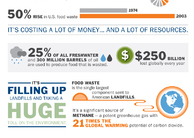Opinion:You Owe Me: Examining a Generation of Entitlement
By
2011, Vol. 3 No. 01 | pg. 1/1
KEYWORDS:
Once upon a time, in a land called America, people truly believed in a capitalist system. Citizens worked hard their entire lives to feed into their 401-K plans and expected that depending on how the economy went, they may profit from their work. They did not depend on the American government to take care of everything for them; in fact they had a great sense of personal responsibility. Other countries, such as France and Britain, have experienced a high burden being placed upon their governments over these decades, due to their citizens believing in a cradle to grave system in which from the time they are born to their death they can rely on the government to fund their welfare and upon retirement age, they will have everything they are “entitled” to handed to them on a silver platter. It appears now, that our country may be leaning more and more toward this mentality. With each generation, we begin to see a growing entitlement mindset. If this trend continues, America too will soon feel the same weight as those European countries have for generations, and our country may go bankrupt. Why is the country turning to this mentality? How can it be prevented? Children in the most recent generation of adults born between 1982 and 1995, known as “Generation Y,” were raised to believe that it is their right to have everything given to them more than any other previous generation. Between 1979 and 1984, the Public Relations Society of America conducted a series of surveys on the American public to determine whether or not there was a growing trend of entitlement being spread throughout popular opinion. The results showed that indeed a trend had sprouted within society that more and more citizens were beginning to expect institutions to provide for them rather than providing for themselves. The reports detailed that “expectations beginning to surface at the time might have a moderating influence on entitlement attitudes [in the future].” This was a scary idea for the American people (Detweiler, 1986).Prior to this split in mentalities between the older and younger generation, Americans as a whole had consistently backed the idea of reaping the rewards of one’s own work. Popularly coined phrases such as, “There is no elevator to the top, you need to take the stairs,” were a common outlook on working life amongst Americans, and nobody expected anybody else to provide for them. This attitude began to change in the 1980s, with a growing sense of urgency to provide the next generation with an “easier life” then had been given to its parents. Unfortunately, this genuinely good-intentioned decision made for a generation of children who misunderstand the meaning of work. Parents have instead instilled in their children the idea that “entitlement” should have a positive connotation, and that any public assistance programs should be favored and supported, and that “labor” is no longer a term to take pride in, but instead something to reject at all costs. Parents who in their youth happily took odd jobs to provide for their families, have raised children who would rather not work at all then take a job they do not believe is luxurious enough for them, and have no shame in sucking society’s economic pool dry. This never-ending cycle of blame evasion is perpetuating the trend. Youth refuses to identify the faults in its process, and those who are able to see that the actions of themselves and their fellow “Generation Y-ers,” only push the blame back onto their parents. While it may very well be true that their parents planted the seed, Generation Y’s inability to take any type of personal accountability and reform their behaviors is the disease that could ultimately cause this generation to implode America (Brown, 1999). In the past, it has been seen time and time again, in the economic downfalls of many other developed nations, that an entitlement attitude can be the force that drives a nation to economic desperation. In Northern Ireland, just five years ago, MLAs—politicians who serve similarly to state representatives in the United States—were taking double benefits and pay raises, while thousands of farmers suffered bankruptcy due to inflation and a bad crop. Corruption is common and almost accepted, with these government appointees claiming a lesser salary on public record whilst still being able to write off housing and food expenditures that they may incur while working. Even more ridiculous than their actions is the attitude which accompanies them. Nowhere is it seen that these government officials are being gracious or thankful for the privileges that are being given to them while the rest of their country is in a state of economic turmoil. Instead, it is arrogance and a sense of entitlement that seems to radiate from the very pour of these “public servants,” who seem to have forgotten their role in the lives of the citizens of their country. These public officials have the audacity to claim that they are owed these benefits by their country in return for their service. With benefits like these not even being offered to serving soldiers and veterans, it is simply disgusting to have these politicians believe that their “serving” their country from the plush seat of a government office entitles them to steal from the poor (Mandryk, 2005). Today, the economy continues to wane and the response of our country, in contrast to those of other countries, such as France, which has traditionally sustained an entitlement attitude, is at a pivotal climax in America. In France, President Sarkozy recently raised the age of retirement to 62, from 60, the lowest retirement age of all the developed countries. Even being so low in comparison to the other countries, the unions in France have become outraged, holding strikes which are seriously affecting the country’s ability to function. The strikes have caused substantial railroad and air traffic disruption, although probably the most affected by the strikes will be public transportation and school systems. Irony remains as these strikes, meant to protest the fact that the government is not adequately taking care of society, are actually disintegrating the government’s ability to provide any service to the public. While this state of mind is certainly problematic, it is anything but shocking; France’s history was built upon a cradle-to-grave mentality. This mentality is so overwhelmingly embedded into the fabric of society that those in their twenties are engineering protests against the raising of the retirement age, and they are years away from being able to take part in the pension system. This shows that even at their young age, when most are socially and politically uninformed, the one issue they are aware of and willing to take a stand on is their right to be given much for little (Reuters, 2010). The reaction to a similar situation which has recently unfolded in America however, is strikingly dissimilar. With the economy still dragging along, many Americans of retirement age have found their 401Ks depleted. After working for years and feeding portions of their salary into these funds which promised to ensure their ability to comfortably retire at age 65, one would think that these people have as much right as any to be enraged. However, the popular response of retirement aged Americans has not been rage at all. Instead, with an air of disappointment looming, the majority of retirement aged Americans interviewed by the Christian Science Monitor seemed to accept that this is the hand fate has dealt them, and have taken it upon themselves and their own personal responsibility to cope with this unfortunate series of events. Picking up part time jobs, or extending their work years before retirement has been necessary for many of these Americans. It would appear though, that this mentality is not unlike the one that they were raised with. Unlike the most recent generation of upcoming workers, the retirement aged generation, who raised most of today’s entitled young people, were raised with a sense of personal accountability, and believed that it was their responsibility to ensure their own welfare and the government’s responsibility to lend a helping hand if someone fell down. This is a very different outlook on life then was bread into Generation Y, which seems increasingly to have no problem living an entire life within social safety nets, defeating their purpose, and depleting their usefulness (Gardner, 2010). Many politicians are beginning to call on the public to change the path America is going down and abolish the ever-looming entitlement attitude. In 2008, during perhaps the most dangerous period in American economic history since the Great Depression, an article in Human Events criticized America’s mentality that those who did not earn had an inherent right to leech off of those who did. “To finance "entitlement" programs, the government threatens force against the taxpayers who provide the money,” it stated. “Why are people who favor compulsion called humanitarians, while those who favor freedom are stigmatized as greedy?” (Stossel, 2008). While there is perhaps an underlying conservative slant present in the dramatization of the question, the underlying inquiry is valid. The American government, instead of perpetuating a sense of hard work and pride in self-progress like it did in the past, is instead strong-arming the public into supporting programs which are robbing them of their ability to care for themselves to provide for a generation that might be able to provide for itself, but chooses not to. It is projected that in the next few decades, the federal budget will almost double the portion delegated to social safety-net programs (Stossel, 2008). This is simply an abomination. The most sordid flaw in our current system seems to be the ability of those who are no longer unemployed, or no longer have a substantial “need” for taxpayer sponsorship to continue to stay on social safety-net programs, namely welfare benefits, and suck the system dry. In September of 2009, it was estimated that approximately 37 million people were receiving welfare benefits in the form of food stamps, which based on an approximately 307 million person population, puts the number at roughly 12 percent (Wolf, 2010; Census Bureau, 2009). The national unemployment rate measured around the same time however, was only at roughly 9 percent, or roughly 28 million people (Bureau of Labor, 2010). Anyone can do the math and figure out that something is not adding up. Somewhere, almost 10 million people were collecting food stamps that were recorded as being employed. While some of this number can be explained by those who are employed and in school, employed part-time, or fall beneath the poverty line, it also begs the question: why are those who are receiving consistent income allowing others to pay for their basic needs? If their money is not going towards these needs, what is it going towards? In 2007, the International Social Security Review released a detailed examination of the effects of the expansion of these social safety-net programs on the economy. “In its simplest form, the prediction of this theoretical literature is that larger welfare states will have a negative impact on growth. Higher levels of taxes which are necessary to finance most social programs are expected to distort and lower the incentives to invest of private actors and, thus, slow down growth,” the report concluded. It also examined the impacts of these programs on employment determining that statistics supported the fact that “larger welfare states are inimical not only to growth but also to employment,” due to their tendency to raise the cost of labor and thereby decreasing employers ability to afford to employ more workers (Mares, 2007). These conclusions provide an alarming forecast for the economic future of America should the emergent entitlement stance be sustained, or worse, expanded. It is important that this mentality be stifled immediately and replaced with the previously famed American standard of personal excellence that our country was built around. It is not impossible for America to achieve this, but it is required that it start to reform both the attitudes of those just entering the workforce and also, as a preventative measure, those who are still children, who will become the next group of young adults to enter the workforce in the coming decades. In a 1998 piece by the publication Business Insurance, a company charging each of its factories $10,000 for each worker’s compensation claim, in order to force them to get employees back on the job quickly and support efficiency, watched their plan backfire. Instead, the idea created an H.Y.M.N.S., or “Hey You owe Me Now Syndrome,” in which employees believed that they were entitled to workers compensation for every complaint they might be able to conjure. The piece later talks about ways to correct this, such as specifying would be required to qualify for worker’s compensation. It was only after the company realized how much money they were losing that they decided to take a more vested interest in turning around the system that they used to deal with worker complaints. It was identified that while there was a definite crop of workers who had legitimate worker compensation claims, there was another significant group whose work history was consistently riddled with absenteeism and low productivity who conveniently happened to be filing for significant amounts of workers compensation. The company, since deciding to reform their approach, has realized stronger results. It is necessary for the company to seriously sift through the claims and make it known to employees that it is not a free handout. By throwing out unsubstantiated claims and redirecting those with problems that can be handled in other departments, the company is disbanding a collective entitlement attitude within their corporation. Corporate Risk Manager, Gary W. Langsdale, detailed the new approach, by saying, “[The company] is going to be compassionate with legitimate injured people but deal with the bad apples severely.” By not rolling over and taking the abuse of entitlement-ridden workers, the company can sustain its economic viability and provide those who are legitimately deserving of the workers compensation benefits with the help that they need. This model is a good one for many businesses and should be absorbed, and is one that the United States government could surely learn something from. If more segments of our country’s work system begin to take initiatives such as this one, the entitlement attitude within Generation Y could be amply reformed before it collapses our economy (Roberts, 1998). It is just as important that parents discontinue constant financial “babying” of adult children. In a 2008 piece called the Boomer’s Guide, it is discussed how the baby boomer generation, or the parents of the entitlement-driven Generation Y, can cut the financial cord in order to save themselves from personal bankruptcy due to an effort to forever fund the lives of their now helpless adult children. In the piece, its states that on average, a two-parent home making approximately $100,000 annually, spends upwards of $38,000 on each adult child between the ages of 18 and 34, “helping” with anything from credit card debt to down payments on a house, while sustaining less than $50,000 in savings for retirement. These are responsibilities that an adult should be able to take on himself, but which have been taken from him, due to a looming sense of responsibility on his parents part, to never allow him to want or need for anything. Parents must let adults be adults. The reality is, however, that that responsibility should fall to the person himself once he is an adult, otherwise the financial burden will tear his parents savings apart, making them more likely to draw more from social safety nets that they would probably not have needed if they had savings for their own retirement. This perpetuates the circle of government funding that is bankrupting the United States economy (Harris, 2008). It is as equally important however, that those with young children disrupt the recently growing trend of the last few decades of raising children with the entitlement attitude. It is the responsibility of parents now to break the cycle. A temporary solution is not what this country needs, because the entire work of industries to fix the mentality of the current generation of workers will be a useless effort if the next generation of workers in the next few decades comes in with the same problems that are currently tearing our economy apart. There needs to be a longer term solution that will permanently alter this notion of entitlement and that can only be accomplished by alteration of the parenting techniques today. In a 2007 article published in the Beaumont Enterprise, Betsy Hart, discusses her children’s entitlement attitudes and her struggles to parent them in a way that defies current social norms. In the article, Hart discusses her daughter calling her to demand a dollar payment for a piece of candy which she took from her daughter’s Halloween stash. Hart responds with disgust at her daughter’s belief that anything is really hers, and states that, “I reminded [my daughter] again that…everything she has or owns, or think she has or owns, is in fact mine.” Hart goes on to cite a book called, The Blessing of a Skinned Knee, by acclaimed child psychologist and best-selling author Wendy Mogel, that in addition to love, parents owe their children, "Respectful treatment, healthful food, shelter from the weather, practical and comfortable clothing, yearly checkups at the pediatrician and the dentist, and a good education,” and that everything else is a privilege. Unfortunately for our society, privilege is a word that children seem to be no longer acquainted with. It is necessary for children to understand that they must earn the things they have (Hart, 2007). Even those things which Mogel identifies as being owed to them by their parents, children must understand are worked for by their parents in order to understand that they are not inherently available to people without any type of work being done to acquire them. Even at a young age, children must be exposed to what it would be like to be void of these necessities, understand that there are people in the world who go without, and be able recognize in some basic way, that without effort and labor of some kind, they will not have they will not have the things that they are accustomed to. The best approach to exposing children to this idea in an age-appropriate fashion, is to give children chores and responsibilities which are required of them as members of a family, to expose them to the idea of things that may be required of us as responsibilities as members of a society, and chores or tasks that they can choose to do to earn money or privileges that they might not otherwise have available to them. In a 2000 piece called, Teaching Your Child About Money, eight ways to set your child up with habits for financial success are detailed. Among them, is by giving the child an allowance for small tasks such as dish-washing and taking out the garbage, and teaching them how to distribute some money into a savings account and how to responsibly manage spending other money on things that they may want. The piece also notes that one of the biggest mistakes that parents make is giving teenaged and college aged children credit cards and then bailing them out when the bills get out of control. The piece calls this “a sure fire way to set your child up for a lifetime of financial trouble.” It is important that there be consequences for irresponsible decisions and that as children grow they learn that there is not always a financial super-hero waiting to clean up their mess (Ebony, 2000; Lamb, 2009). This is the only way that children will be able to grow into adults who can properly manage finances in the “real world” although what is the real world is now up for debate; quite the catch-22. If Americans can reform the way that the upcoming generation of workers view work versus reward, then the American economy could be saved from the downfall that is already plaguing many once-strong economies of the world. It is integral to this process that parents, businesses, and governments entities work together to restructure the mentality of young people in America and breed a new generation of the once ever-present work spirit that was America’s fame once again into the social fabric of our country. If this cannot be accomplished soon, America could face decades more of economic havoc and it is apparent that this would lead to the eventual downfall of one of the greatest free nations the world has ever known. ReferencesBergsten, Fred. "The risks ahead for the world economy." Economist 372.8392 (2004): 63-65. Academic Search Premier. EBSCO. Web. 28 Nov. 2010. Brown, Cathy. "Feelings of entitlement have spoiled us. " Dallas Morning News 19 Mar. 1999, ProQuest Newsstand, ProQuest. Web. 25 Oct. 2010. Bureau of Labor Statistics, (2010). Labor Force Statistics from the Current Population Survey. Web. 28 November 2010. Detweiler, John S. "Monitoring 'Entitlement' Attitudes in the '80s. " Public Relations Review 12.3 (1986): 28-41. ABI/INFORM Global, ProQuest. Web. 25 Oct. 2010. Gardner, Marilyn. "For more Americans, retiring includes clocking in for work." Christian Science Monitor 14 Nov. 1997: 10. Academic Search Premier. EBSCO. Web. 25 Oct. 2010. Harris, Marlys. "What do you owe your kids?." Money 37.3 (2008): 102-107. Academic Search Premier. EBSCO. Web. 28 Nov. 2010. Hart, Betsy. "Daughter's entitlement attitude has mom seeing red " Beaumont Enterprise 13 Nov. 2007, ProQuest Newsstand, ProQuest. Web. 25 Oct. 2010. Lamb, Sabrina. "Your children & money." Ebony 64.7 (2009): 42. Academic Search Premier. EBSCO. Web. 25 Oct. 2010. Mandryk, Murray. "Entitlement attitude disgusting." Star - Phoenix. 1 Apr. 2005, Canadian Newsstand Complete, ProQuest. Web. 25 Oct. 2010. Mares, Isabela. "The economic consequences of the welfare state." International Social Security Review 60.2/3 (2007): 65-81. Academic Search Premier. EBSCO. Web. 27 Nov. 2010. Reuters. "France: Plan To Raise Retirement Age Sets Off Strikes." New York Times 07 Sept. 2010: 6. Academic Search Premier. EBSCO. Web. 25 Oct. 2010. Roberts, Sally. "Combating entitlement attitude toward workers comp. " Business Insurance 4 May 1998: ABI/INFORM Global, ProQuest. Web. 25 Oct. 2010. Stossel, John. "Congress Still Ignores Entitlement Monster." Human Events 64.21 (2008): 19. Academic Search Premier. EBSCO. Web. 28 Nov. 2010. "Teaching your Children about Money." Ebony 55.12 (2000): 32. Academic Search Premier. EBSCO. Web. 28 Nov. 2010. United States Dept. of Commerce, Census Bureau. USA QuickFacts 2009. "Population Characteristics. Current Population Reports P20-520." Washington: GPO, 2009. Web. 27 November 2010. Wolf, R. (2010, January 25). "Welfare rolls up in ’09; more enroll in assistance programs." USA Today. Web. 28 November 2010. Suggested Reading from Inquiries Journal
Inquiries Journal provides undergraduate and graduate students around the world a platform for the wide dissemination of academic work over a range of core disciplines. Representing the work of students from hundreds of institutions around the globe, Inquiries Journal's large database of academic articles is completely free. Learn more | Blog | Submit Latest in Opinion |
















